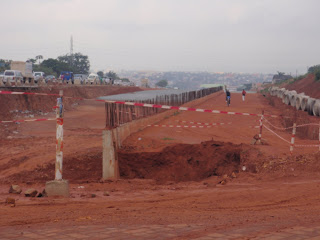


There are so many things that one encounters here that are worth mentioning, random though they are. So here goes a digest of random reflections. No logic. No chronological order.
Slow Down. Golfers Crossing: About halfway in my commute there is a lush green swath that provides cool shade and a respite from the endless red dust of Accra. It comes upon one almost out of nowhere and suggests that once Accra may have been the site of farmers’ fields and rich wild vegetation. It is as surprising as when one suddenly is enveloped by Stanley Park or High Park or even Central Park, more appreciated because more unexpected in the surrounding urban chaos. It took some time to ascertain what those verdant hedges are hiding from the endless stream of cars and taxis and tro-tros. It is the Achimota Golf Course. The tip off was finally noticing, in the chorus line of signage that forms the boundaries of the street, a sign: Slow Down. Golfers Crossing. Such a sign can only reveal one of two world views: the hubris of the privileged or the triumph of hope over experience, because there is no way, absolutely no possibility, under any circumstances, that Accra drivers will slow down for anybody ever.
Another utterly baffling aspect of this golf course – if anything can be more baffling than golfers crossing this road to move from one hole to the next – is a form of hazzard never before encountered in my experience. Each tee box and each green that I can see through the trees from my taxi window, is surrounded by enormous advertising bill boards, standing on all sides except the direction that one hopes to hit the ball. They positively loom over tee or green, at least twenty-five feet high. Certainly, Ghanian golfers must have prodigious powers of concentration to come anywhere near to par.
Fridays: Canadian workplaces used to have Casual Fridays, a practice that has morphed into perpetual sloppiness in too many contexts. In Ghana, people dress far more smartly for work: it reminds me of the 80s or 90s. Ties, skirts, and so on. But here there is also a change to the dress code on Fridays: people wear either traditional dress or organizational dress. Last Friday I was fully inducted into CRI by receiving two polo shirts with the CRI and EU logos and, emblazoned on the back, Justice for Juveniles. Very smart. In two shades of blue (light and royal). Now I’m a full-fledged member of the team.
Signs, signs, everywhere there’s signs:
Sand and stone for sale: why in a place with a superabundance of both?
The President of the Republic of Ghana, holding a stylized World Cup: Let us rally round the flag and support the Black Stars.” The newspapers report that the Revenue Agency is now about to go after all the bonuses the soccer players received for doing so well. In the World Cup. What if they had won, I wonder?
In the Dzowrulu section, where I work: House to let. Nice 4 bedroom and boys. Some things cannot be glossed.
Hotel Obama
Seamstress and...?
Ghana is renowned for its cloth. The best known is kente, the heavily woven and extremely bright cloth worn by men of standing in the south. Less is said of the amazing fabrics and prints of women’s clothing, and of the fact that cloth can be bought virtually anywhere from a swish boutique to a craft market to the mall to the ubiquitous vendors. I even noticed one hawker with cloth one day walking through the traffic (surely too dusty to sew?) Every block seems also to have one or two free lance seamstresses who will whip up anything you wish. If they don’t have a pattern, just describe what you’d like.
I purchased some cloth, not inexpensive by Ghanian standards, at the African Queen boutique, which has the distinct advantage of being conveniently located around the corner from the office. She took me to her friend the seamstress, hidden behind an enormous wall and corrugated iron gate. Without a sign she was invisible. Going inside the gate was astonishing. On the front porch were a mother and three or four younger women, sewing like mad on hand driven sewing machines. Not one foot pedal machine, let alone an electric sewing machine. Some of the women were daughters, others seemed to be young apprentices. As I stood on the porch being measured, I watched the family’s other business in action: a small cat, with a loader, moving what looked to be dead car transmissions from one pile to another. I don’t know what they do with them. Scrap them? Refurbish them. Or just collect them? This also is the only place I have seen a kitten: a pet certainly, but so mangy and scraggly and thin that only an irrational fear of rabies kept me from scooping it up and carrying it off.
One last thought: will my jackets smell of transmission fluid?

